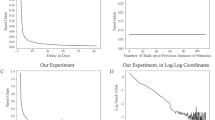Abstract
Cognitive models has been a main tool for quantitatively testing theories on human cognition. The results of previous cognitive modeling research collectively suggest the comparative advantage of exemplar over prototype accounts in human cognition. However, we hypothesized that unsuccessful outcomes by traditional prototype models may be the unforeseen consequences of the algorithmic constraints imposed on the models, but not of the implausibility of the theory itself. To test this hypothesis, a new cognitive model based on prototype theory with a more complex and realistic attention system is introduced and evaluated in the present study. A simulation study shows that a new model termed CASPRE resulted in a substantial improvement as compared with the traditional prototype model in replicating empirical findings and that it performed marginally better than an exemplar model, thus confirming our hypothesis.
Preview
Unable to display preview. Download preview PDF.
Similar content being viewed by others
References
Medin, D.L., Schaffer, M.M.: Context Theory of Classification Learning. Psychological Review 85, 207–238 (1978)
Nosofsky, R.M.: Attention, Similarity and the Identification-Categorization Relationship. Journal of Experimental Psychology: General 115, 39–57 (1986)
Matsuka, T.: Generalized Exploratory Model of Human Category Learning. International Journal of Computational Intelligence 1, 7–15 (2004)
Aha, D.W., Goldstone, R.L.: Concept Learning and Flexible Weighting. In: Proceedings of the 14h Annual Meeting of the Cognitive Science Society, pp. 534–539. Lawrence Erlbaum Associates, Hillsdale (1992)
Anderson, J.R., Fincham, J.M.: Categorization and Sensitivity to Correlation. Journal of Experimental Psychology: Learning, Memory & Cognition 22, 119–128 (1996)
Matsuka, T.: Simple, Individually Unique, and Context-Dependent Learning Method for Models of Human Category Learning. Behavior Research Methods 37, 240–255 (2005)
Matsuka, T.: Modeling Human Learning as Context Dependent Knowledge Utility Optimization. In: Wang, L., Chen, K., S. Ong, Y. (eds.) ICNC 2005. LNCS, vol. 3610, pp. 933–946. Springer, Heidelberg (2005)
Kohonen, T.: Self-Organizing Maps, 3rd edn. Springer, Berlin (2001)
Love, B.C., Medin, D.L., Gureckis, T.M.: SUSTAIN: A Network Model of Category Learning. Psychological Review 111, 309–332 (2004)
Kruschke, J.E.: ALCOVE: An Exemplar-Based Connectionist Model of Category Learning. Psychological Review 99, 22–44 (1992)
Smith, J.D., Minda, J.P.: Thirty Categorization Results in Search of a Model. Journal of Experimental Psychology: Learning, Memory, and Cognition 26, 3–27 (2000)
Author information
Authors and Affiliations
Editor information
Editors and Affiliations
Rights and permissions
Copyright information
© 2006 Springer-Verlag Berlin Heidelberg
About this paper
Cite this paper
Matsuka, T. (2006). A Model of Category Learning with Attention Augmented Simplistic Prototype Representation. In: Wang, J., Yi, Z., Zurada, J.M., Lu, BL., Yin, H. (eds) Advances in Neural Networks - ISNN 2006. ISNN 2006. Lecture Notes in Computer Science, vol 3971. Springer, Berlin, Heidelberg. https://doi.org/10.1007/11759966_6
Download citation
DOI: https://doi.org/10.1007/11759966_6
Publisher Name: Springer, Berlin, Heidelberg
Print ISBN: 978-3-540-34439-1
Online ISBN: 978-3-540-34440-7
eBook Packages: Computer ScienceComputer Science (R0)




